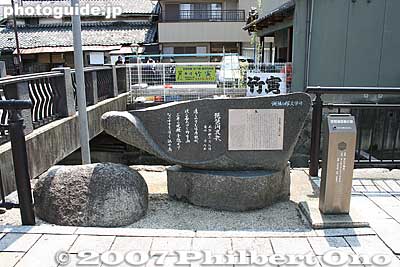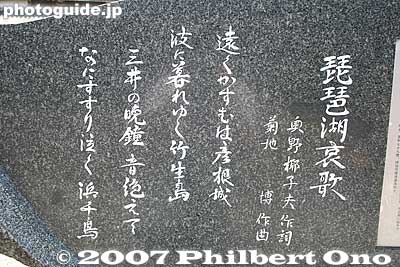Biwako Aika
| Biwako Aika monument in Katata, Otsu |
| Biwako Aika 1st verse |
by Philbert Ono
Biwako Aika 琵琶湖哀歌 (Lake Biwa Elegy) is a mournful song dedicated to the eight college rowers from Kanazawa, Ishikawa Prefecture and three rowers from Kyoto who died on Lake Biwa while rowing in waters off Takashima-cho, Haginohama beach when they encountered strong winds from the Hira mountains on April 6, 1941. The boys from Kanazawa were students at the No. 4 High School 第四高等学校 which today is Kanazawa University.
The rowing club were in Shiga Prefecture to compete in a national collegiate rowing championship held on Seta River. It was a tradition for them to row between Otsu and Imazu (60 km) before the meet. That is when the accident occurred, about 1 km off the coast. It took about two months to recover all their bodies. Even after the police stopped looking for the bodies, local fishermen using fishing nets kept searching for the bodies until all were found.
In the following year in 1942, 1,000 cherry trees were planted along the coastal road nearest to the rowing accident site. A monument for the fallen rowers was also built on the Haginohama shore. Biwako Aika became a national hit soon afterward. The cherry trees grew and became a major flower-viewing spot. However, due to age, many of the trees have withered or died. In 2004, a group was formed to help preserve the trees.
The song was written by Katata-native Okuno Yashio (1902-1981) 奥野椰子夫 and music composed by Kikuchi Hiroshi 菊地博. The music has similar notes to Biwako Shuko no Uta which was created earlier in 1917. Biwako Aika was released as a record in June 1941, sung by Shoji Taro (1898-1972) (東海林太郎) and Ogasawara Mitsuko (1920-) (小笠原美津子) and became a national hit.
Even in Shiga, many people mistake Biwako Shuko no Uta for Biwako Aika.
Biwako Aika (Lake Biwa Elegy) Lyrics
The left column is the Japanese lyrics, middle column is romanized lyrics, and the right column is an English translation. There are four verses.
|
1 |
1 (Romanized) |
1 (English translation) |
|
2 |
2 (Romanized) |
2 (English translation) |
|
3 |
3 (Romanized) |
3 (English translation) |
|
4 |
4 (Romanized) |
4 (English translation) |
Videos
This video footage is from 1969 with Shoji Taro and Ogasawara Mitsuko singing Biwako Aika.
Related Articles
- Lake Biwa Rowing Song - In English
- Biwako Shuko no Uta - In Japanese

